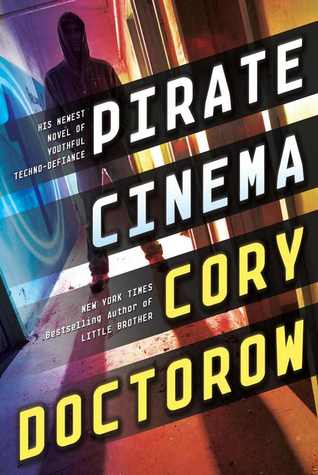
Future Fragments: Doctorow’s Pirate Cinema + “Six Strikes” ‘Net Access
Written by: Anastasia Salter, Pop-Culture Editor
 If you’ve been following the fallout from SOPA and PIPA, the latest move from America’s favorite supervillains the Motion Picture Association and Recording Industry Association of America will be no surprise. A proposal for ISPs to implement further copyright violation “mitigation measures” opens the door to fines, reduced Internet speeds, and even revocation of access. These measures supposedly target file sharing networks and torrenting, but could potentially expand to threaten consumers and creators of transformative works or limit access and sharing of materials of all kinds. And as several ISPs involved are major cable providers, users stuck in areas dominated by those ISPs would have no good alternative. Sound like a dystopian horror story? It already is–Cory Doctorow’s latest, Pirate Cinema, a call to action for us millenials and the rising generation of iPad toting media (re)mixers.
If you’ve been following the fallout from SOPA and PIPA, the latest move from America’s favorite supervillains the Motion Picture Association and Recording Industry Association of America will be no surprise. A proposal for ISPs to implement further copyright violation “mitigation measures” opens the door to fines, reduced Internet speeds, and even revocation of access. These measures supposedly target file sharing networks and torrenting, but could potentially expand to threaten consumers and creators of transformative works or limit access and sharing of materials of all kinds. And as several ISPs involved are major cable providers, users stuck in areas dominated by those ISPs would have no good alternative. Sound like a dystopian horror story? It already is–Cory Doctorow’s latest, Pirate Cinema, a call to action for us millenials and the rising generation of iPad toting media (re)mixers.
Doctorow’s Pirate Cinema envisions a world where this type of law has already taken hold, and further imagines how this would impact a future where we are even more dependent on the Internet than we are now. Work, benefits, education–right now, getting online makes all those things easier. Free “Massively Open” Online Courses are only open to those with the technology to participate in them, and everything from finding to keeping and working at a job is dependent on email, social networks, and Google. Without access to all those things, where would we be? Doctorow explores this through the story of a teenager who caused his family to lose their Internet through his intense desire to make remixes of video to tell his own stories about the construction of media. He leaves home and finds himself in the middle of London, discovering an entirely alternative society that is immediately appealing to those of us who
If Doctorow’s work–particularly this novel–is slightly preachy, it’s not without the best of intentions. Some of the lectures incorporated throughout include reminders of the multiple possibilities of Trusted Computing and the dangers of not really controlling your hardware. Like his previous YA novels Little Brother and For the Win, Pirate Cinema is a clear call to action–a reminder of all the social and expressive possibilities we’d lose if people couldn’t create videos like this, or this–or even this. Transformative works drawn from the stories around us in all media power communities–even cultures–who use borrowed text, songs, characters, footage and games as raw material for their own creative work. It’s not like the industry itself doesn’t do that too (another Sherlock adaptation? srsly?)–it’s impossible to call anything “original.” The word is so over-used as to have lost all meaning, yet the protection of “original” works is still a huge battle in American (and to some extent international) politics. And just a peek over at the mess of the tech patent industry, which xkcd summed up perfectly, shows the wide-spread consequences of these fights to moving forward with innovation.
Doctorow’s film-creating characters are drawn to the untold stories they see in the pieces of existing scenes, and the works they create are new–transformed–if not original. Appropriately, Pirate Cinema itself is not new either, but it is a transformation of the British story of Pirate Radio into modern terms:
The original pirate radio served as an outlet for counter-culture, conveniently following the letter of the law if not the spirit of the law to use a ship as broadcast headquarters for otherwise forbidden rock and roll. Now, Doctorow invites us to imagine the next counter-culture movement–and the legislative and economic penalties that could lead us to truly embrace a new extreme. The internet, our new essential and also the home to so many copyright disputes and legal minefields, could provide a starting point for rethinking all the systems whose rules we take for granted.
As anyone who has ever been low on a repair priority list with dead Internet service already knows, the Internet is not currently a utility. It’s still considered a luxury. Thus, access to it can “reasonably” be limited in If the six strikes policy sounds like the ISPs and government conspiring to inflict a national version of sending the country to bed without dessert, that’s understandable. The entire plan reeks of an attempt to attack teenagers and college students, those both savvy enough to exchange torrents and copyrighted material and with enough time and inclination to do so. But it’s so much more than that. It’s the hub of our connections–the space where “new” ideas can, perhaps, truly take shape.
Anyone horrified by the potential of measures like these ISP “mitigations” and the continued spirit of corporation-serving Internet policy they represIent will see a harrowing future in Doctorow’s all-to-near-future sci-fi. I hope the would-be makers, modders, re-mixers and even active consumers of our digital cultural stream are also tuned-in to what such a world holds for them–as I am not too convinced that such a future is escapable.
